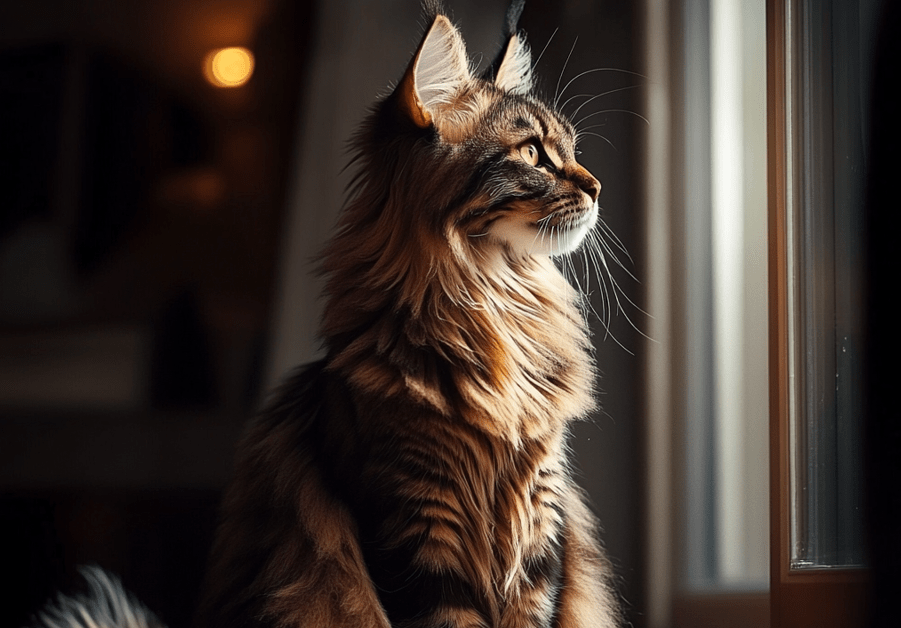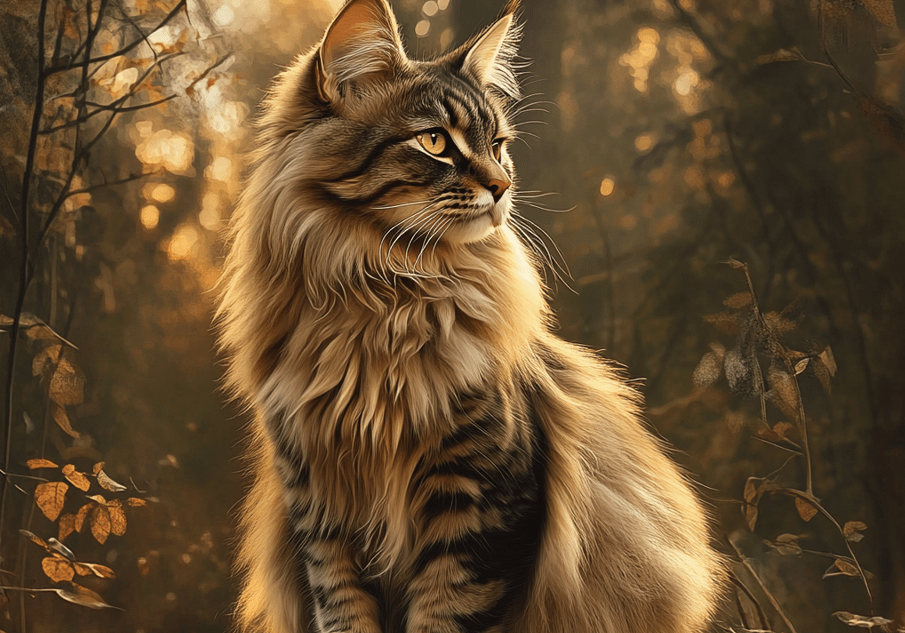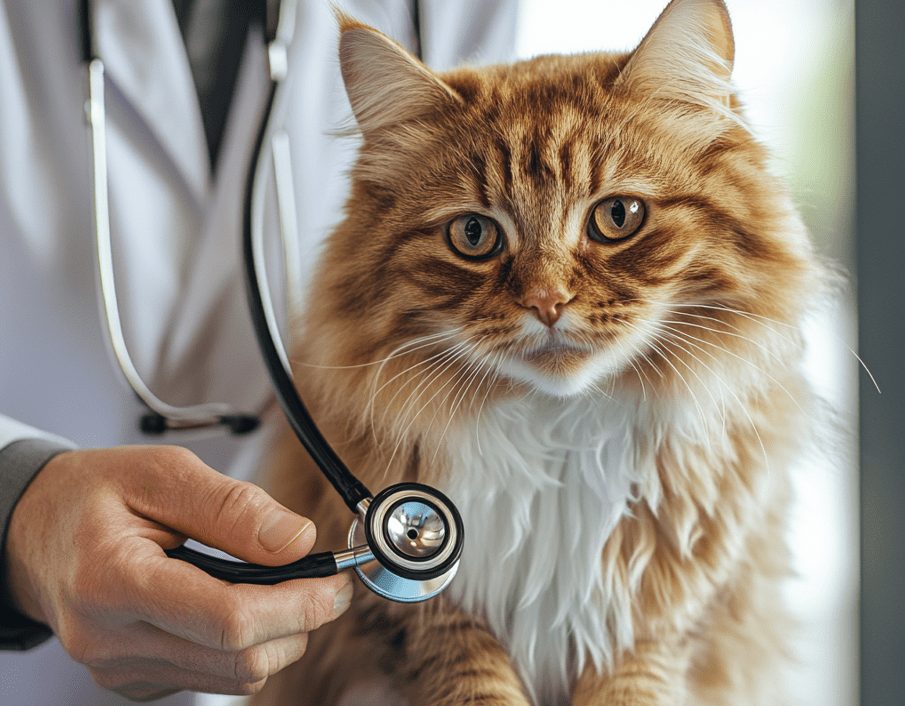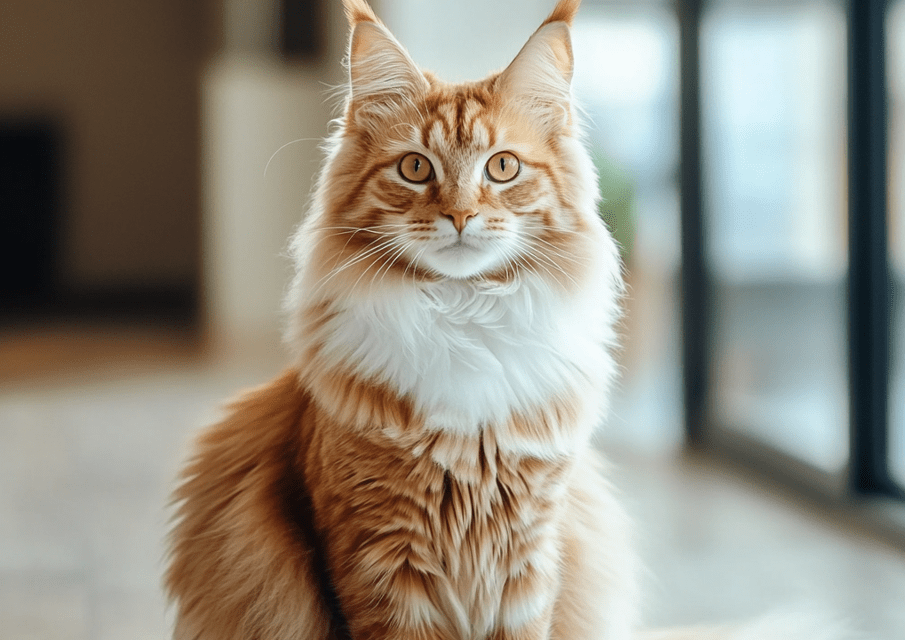
If you’ve been searching for the best Maine Coon care tips to keep your fluffy giant happy and healthy, you have arrived at the right place!
With their huge, affectionate personalities and playful pup qualities, Maine Coons have ranked as one of the most popular house cats throughout the U.S. They’re also one of the biggest domestic cat breeds. They’re longer bodied than most breeds, but they have much bigger heads and paws. Maine Coons use their furry feet as fluffy snowshoes. And for added stability on slick grades, many Maine Coons are “polydactyl,” meaning they have more than the usual amount of toes on each paw.
In addition to being big, Maine Coons have some dog-like behaviors, such as their affinity for water and tendency to play fetch. Overall, they are a relaxed bunch of cats that enjoy being with their humans.
Maine Coon Cats and Their Health Issues
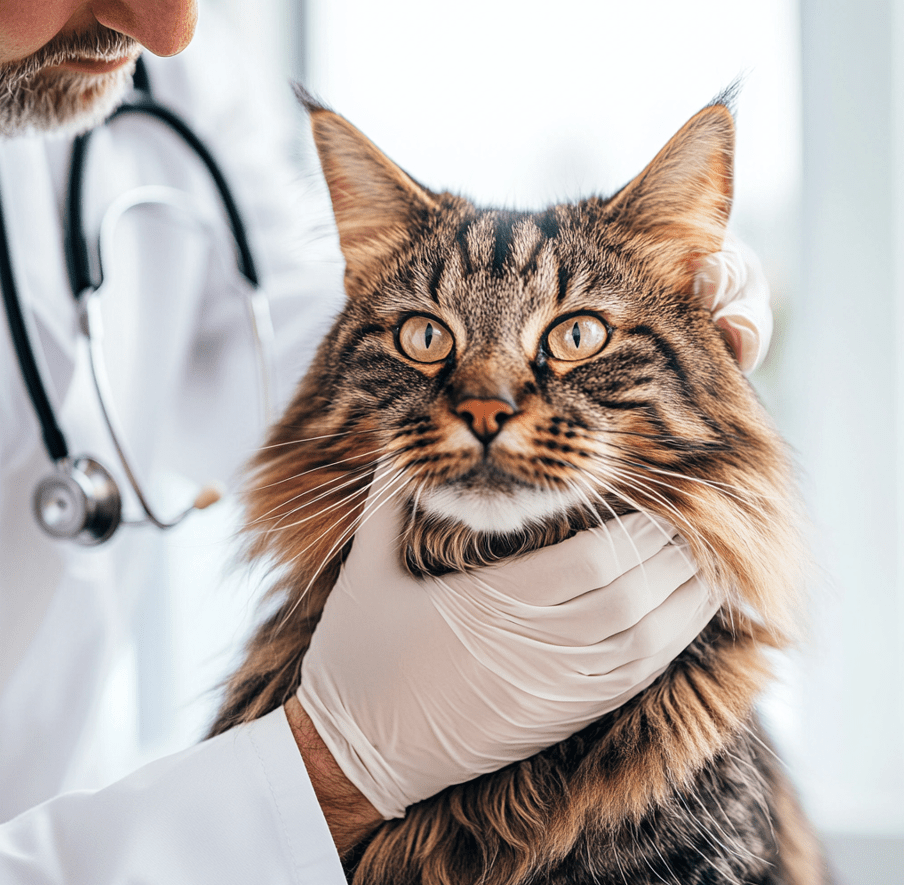
Maine Coons have an average life span of about 13 years, shorter than many other cats. Due to their genetic predisposition to excessive inherited diseases, it is highly recommended that a considerable investment to be made in health insurance for Maine Coon kittens.
Hypertrophic Cardiomyopathy (HCM)
Hypertrophic cardiomyopathy, the most common type of feline heart disease, can be undetected in its early form. In advanced stages of the disease, symptoms similar to heart failure, like lethargy and difficulty breathing, can emerge. Fortunately, there are steps you can take to get ahead of this disease:
Genetic variation: HCM presents in a breed-specific manner. Maine Coons, for example, may harbor mutations in two particular genes associated with this condition. DNA tests performed in a doctor’s office can identify these mutations before symptoms occur.
Prevention: The sole preventive measure for Maine Coons is the annual echocardiogram (heart ultrasound). It’s also a good idea to ask the breeder whether there’s a history of HCM in the cat’s bloodline.
Spinal Muscular Atrophy (SMA)
Spinal muscular atrophy is a neurological disorder that affects a cat’s physical abilities but does not have any impact on their mental functions. Kittens affected with SMA show signs of the disorder including weak muscles and poor muscle tone between 3 to 4 months of age. That causes a shuffling gait and shakes. While SMA leads to a specific type of cat spinal deterioration, cats with SMA can live a full, happy life with ongoing specialized care.
Polycystic Kidney Disease (PKD)
The kidneys are organs essential in filtering waste and maintaining fluid and electrolyte balance, as well as producing hormones necessary for survival. Cats genetically predisposed to polycystic kidney disease slowly form cysts in their kidneys, causing irreversible damage. Like HCM, at-home DNA tests can detect PKD before symptoms appear. When choosing a Maine Coon, make sure the breeder has had both parent cats tested for it genetically.
Hip Dysplasia
The hip joints are either misaligned or too loose in hip dysplasia and cause discomfort and eventually arthritis. Symptoms include hesitance to climb stairs, jump or use the litter box correctly. Management strategies involve keeping a healthy weight, a joint-supportive diet, and surgical intervention in severe cases.
Chronic Gingivitis
Gingivitis, or inflammation of the gums, is the first stage of periodontal disease. While all cats can develop this condition, Maine Coons especially are prone to juvenile gingivitis as early as 7 months old. Brushing teeth twice daily and getting dental checks done by vet on regular basis is very important to make sure free from oral problems.
By being aware of these health issues and taking preventative steps, Maine Coon owners can help their cats live healthier, happier lives.
What to Feed a Maine Coon
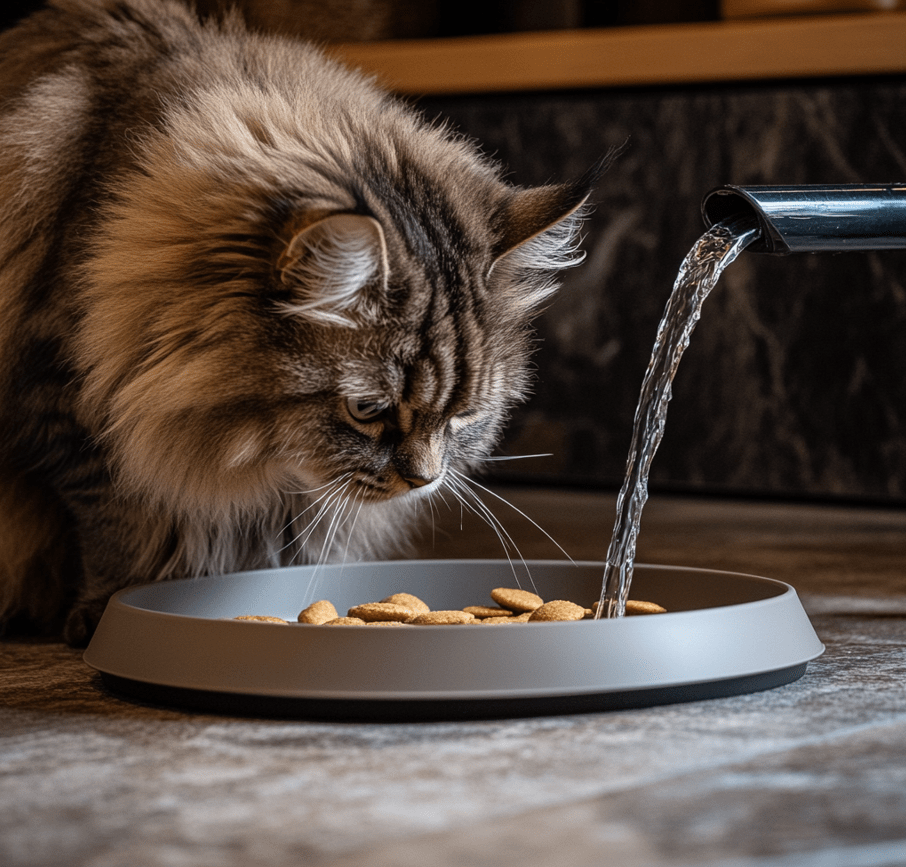
Like all cat breeds, Maine Coons require a diet high in animal protein. The best cat food is one that meets the nutritional guidelines of the Association of American Feed Control Officials (AAFCO), which is specific to your cat’s life stage. The “growth” formula is better suited for Maine Coon kittens, whereas the “adult maintenance” formula is appropriate for specimens aged two years old and older.
How to Feed a Maine Coon
Did you know Maine Coons have the longest whiskers of all the domestic cat breeds? And to minimize whisker fatigue, it’s better to use wide food and water bowls. While water fountains can encourage proper hydration, Maine Coons are especially playful when it comes to water. So if you catch your cat testing the waters in the fountain, don’t be shocked.
How Much to Feed a Maine Coon
How much food should a Maine Coon eat? That all depends on the weight, activity level, health and age of each individual Maine Coon. Although general feeding guidelines can be found on cat food packaging, consulting your veterinarian is the best way to deduce the ideal portion size and diet for your cat. A vet can recommend what is best to help keep your Maine Coon healthy.
Maine Coon Nutritional Information & Dietary Requirements
To ensure that your Maine Coon’s needs are met, look for an AAFCO nutrition statement on the cat foods included in this guide. These foods are formulated with the dietary needs of your Maine Coon in all life stages. Kittens should have food formulated for growth or life stages, and older cats need age-appropriate formulas. In most cases, unless suggested by your veterinarian, supplements are unnecessary. However, if a cat owner is looking to be proactive, they may wish to ask their vet about joint supplements to help protect their cat’s long-term health.
Maine Coons Behavior and Training Tips
Maine Coons are gentle souls that are friendly companions. All cats have individual personalities, but Maine Coons are typically known for their friendly and easygoing nature.
Maine Coon Personality and Temperament:
If you have kids at home, then the Maine Coon is often described as an ideal family pet because of their gentle and affectionate nature. They are protective and kind to children and other pets even though they are big in size. Unlike many other cat breeds, Maine Coons are not overly chatty. Instead of the frequent meowing that makes most people think of cats, they often communicate by producing unique sounds that can include chirps, chatters and trills.
Maine Coon Behavior
Like all cats, Maine Coons need social interaction and exercise to remain happy. Playing with your Maine Coon for 10 minutes a day helps to prevent common behavioral problems, including excessive meowing or furniture scratching. Although they do love quick stretches of being rascally, Maine Coons also enjoy relaxation and are often discovered lounging around napping in a warm place (such as their bed, sunbeam or next to you on the couch).
Maine Coon Training
If the litter box is located appropriately, most cats will learn to use it instinctively. And yet, because Maine Coons are really bright and curious, they learn fast. Using positive reinforcement methods, like a training clicker, you can train your Maine Coon to do both fun tricks (like fist bumping) and practical commands (like coming when called). Training is not only great mental stimulation for your cat but also helps build a more solid bond between you and your furry friend.
Maine Coon Fun Activities
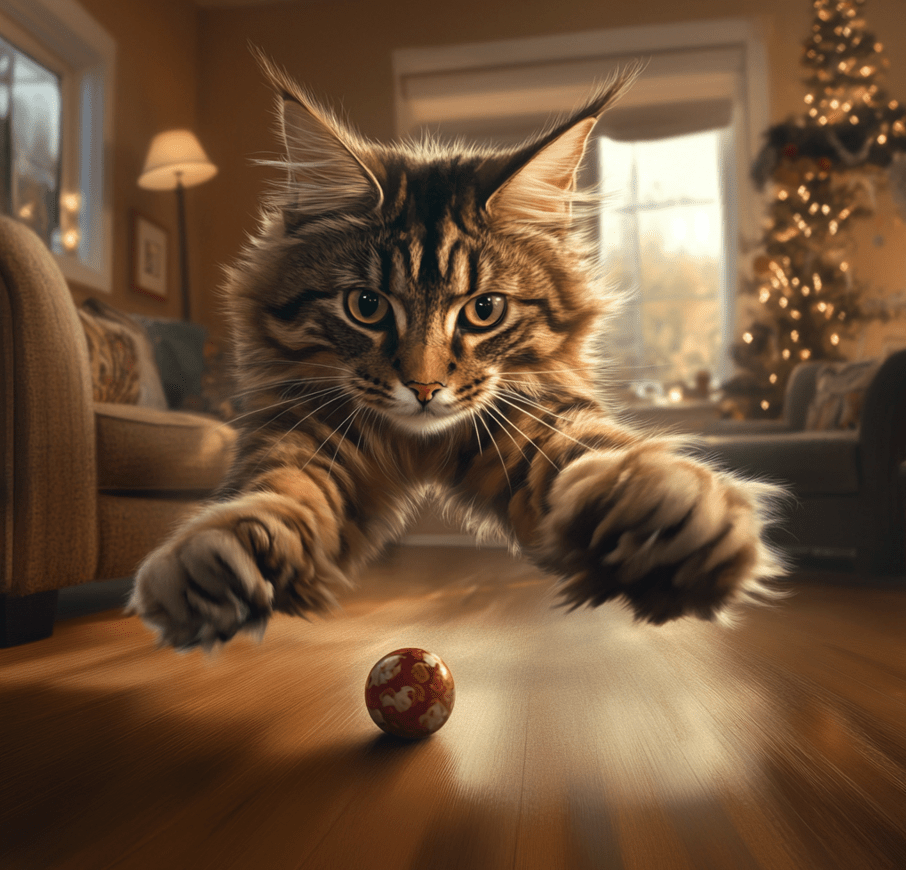
Try out these activities to keep your Maine Coon entertained and happy:
1.Playing fetch
2.Allowing them to sun bathe on a window perch
3.Taking them for walks with a harness and leash
4.Offering a catio for bird watching
5.Puzzle toys for mental stimulation
Following these tips and activities can help your Maine Coon to maintain good physical, emotional, and behavioral health.
Maine Coon Grooming Guide
Maine Coon cats have long, thick fur, which can get greasy or matted without regular grooming. Here’s what you need to know to understand and fulfill their grooming needs.
Skin Care
If your Maine Coon’s hair seems too oily, it might be time for a bath. Most Maine Coons take baths well, especially if they are exposed to bathing early on.
Coat Care
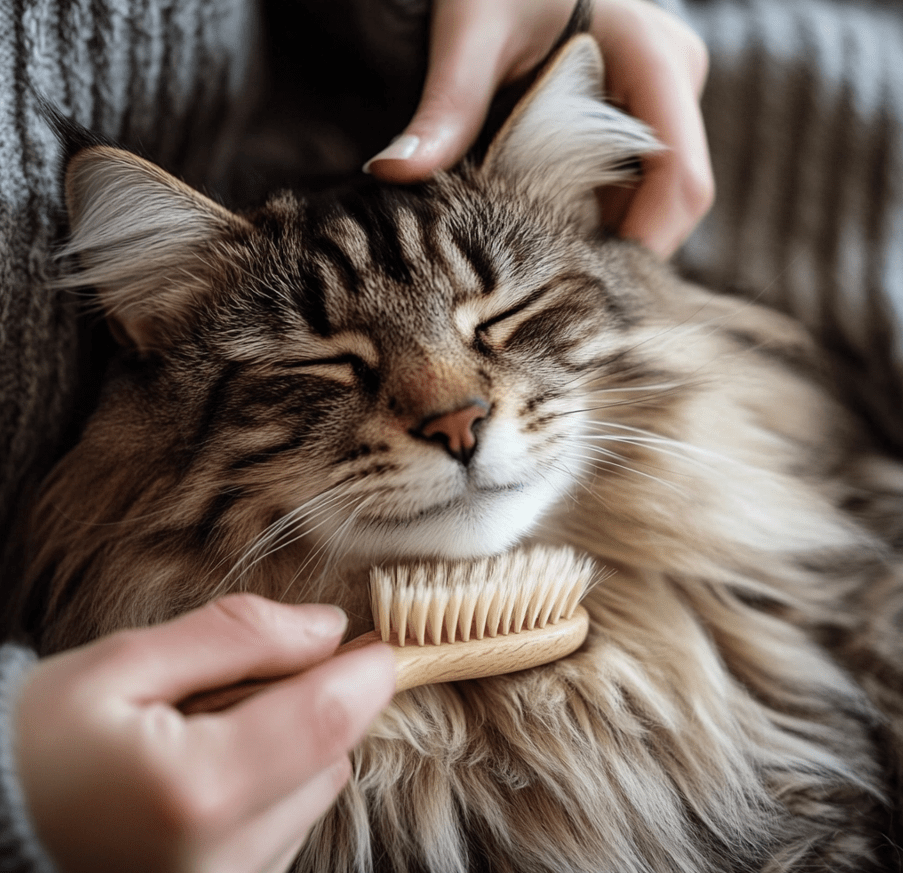
Maine Coons have a variety of colors and patterns, from solid white to tabby, calico and chocolate. Regardless of color, they have thick double coats that originally helped them survive the brutal winters of Maine. Many Maine Coons now live as indoor companions, but they still need regular coat maintenance.
Brush your Maine Coon to prevent matting two to three times a week. If large mats develop, you might have to call in a professional groomer.
Eye Care
They have oval-shaped eyes that can be gold, green or blue. Their eyes usually don’t need specialized attention, but if you notice unusual discharge, redness or crustiness, take them to the vet. Medication can quickly take care of most eye issues.
Ear Care
Maine Coons are also susceptible to ear infections because of their large ears. Ensure their ears are kept clean and dry especially after baths and water exposure. You might notice redness, odor or discharge, all signs of an infection. If you see these symptoms, make sure to contact your veterinarian for treatment.
These grooming tips will help keep your Maine Coon healthy, comfortable, and looking their best.
Considerations for Pet Owners
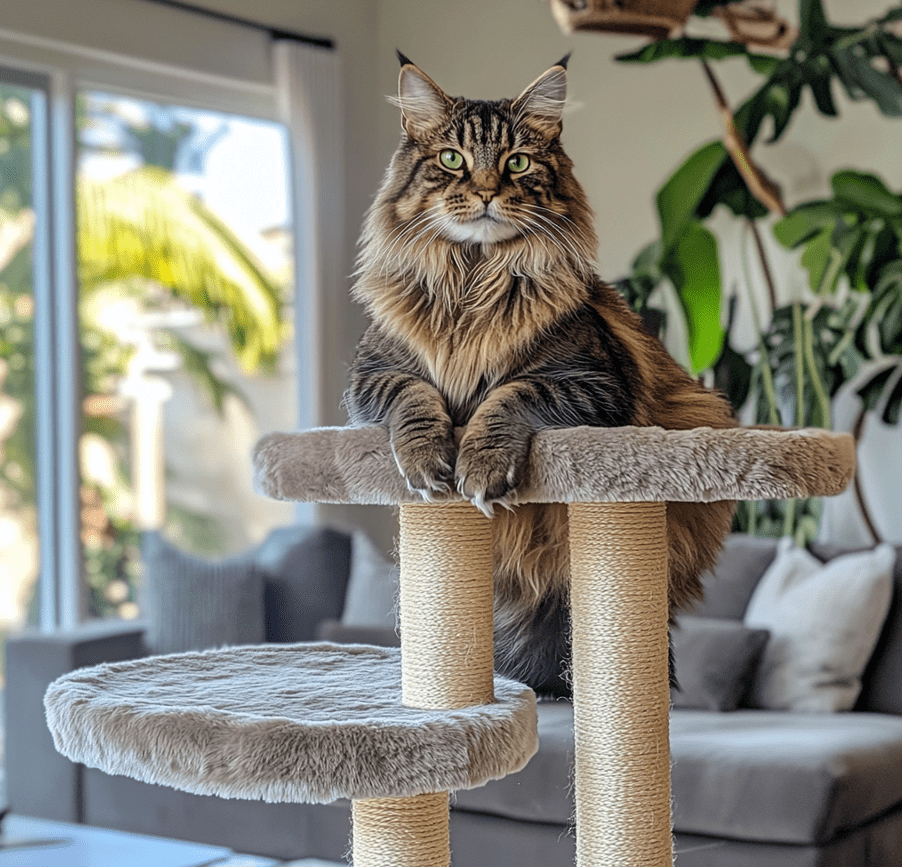
Bringing a Maine Coon kitten into your home is not just adding an animal, but a new member of your family. While they are not the most lap-able of felines due to their size, they are very loving and become extremely bonded to their human companions who they want to have frequent interaction with.
As much as they love spending time with their favorite humans, Maine Coons also need some mental stimulation to keep their spirits high. Investing in a large, multi-level cat tree is a must. It must be at least 6 feet tall, and the base should be stable to support potential weight and plenty of space to stretch and climb. Maine Coons need bulkier products, such as big litter boxes and plush beds, to accommodate their size.

